Randy Ribay's Blog, page 3
March 29, 2017
WELCOME HOME COVER REVEAL
[image error]
Today, YA Books Central is hosting the cover reveal and a giveaway for WELCOME HOME, the adoption-themed anthology edited by Eric Smith in which I have a story! The other contributors include Adi Alsaid, Nic Stone, Dave Connis, Helene Dunbar, Libby Cudmore, Lauren Gibaldi, Matthew Quinn Martin, Mindy McGinnis, Sammy Nickalls, Shannon M. Parker, Karen Akins, Erica M. Chapman, Julie Eshbaugh, Shannon Gibney, Jenny Kaczorowski, Julie Leung, Sangu Mandanna, Lauren Morrill, Tameka Mullins, C.J. Redwine, William Ritter, Courtney C. Stevens, Kate Watson, Stephanie Scott, Natasha Sinel, and Tristina Wright. Add it to your Goodreads shelf, and pick it up in September!

March 13, 2017
ISRAEL RECAP
[image error]
I’ve been home for a few days now, and I think I’ve just about recovered from the 17-day trip with our school’s junior class to Israel. Since returning, a lot of people have asked me, “How was the trip?” I usually say something like, “It was really good!” and then scuttle away like a crab because conversation is hard. So this is my attempt to genuinely answer that question in some detail for those who might be interested. I’ll briefly recap what we did, and then I’ll give you my take-aways.
First, we spent a couple of days in the Judean and Negev deserts. We hiked Masada at sunrise, ate lunch at a kibbutz called Yeroham, hiked a makhtesh, swam in the Dead Sea, and rode camels.



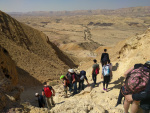
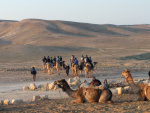

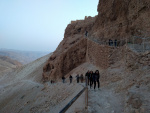



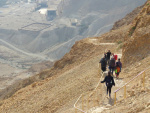

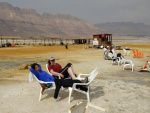

From there, we headed into Jersualem where we spent five days exploring the city. We walked around the City of David, shopped in the Mehane Yehuda Market, welcomed Shabbat at the Western Wall, went to services at a synagogue where the resistance hid weapons during the War for Independence in 1948, checked out the wall/fence at the border of East Jersualem and Bethlehem, walked around the old city and went to the Church of the Holy Sepulchre (where Christ was crucified, buried, and resurrected), went to Yad Vashem (the national Holocaust museum) and Mt. Hertzel (Israeli military cemetery).
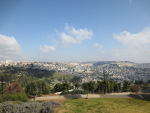
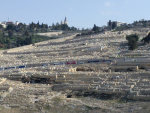





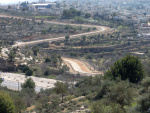









We then headed to the north for a few days where we learned about the Ethiopian Jews, hiked the Arbel Cliffs overlooking the Sea of Galilee, went to the Lebanon border, spoke with soldiers at an IDF base, made chocolate in the Golan Heights, walked around Tzfat (the home of Kabbalah), learned about the Arab Christian community in Nazareth, and learned about the Druze community on Mt. Carmel. Next, we traveled to Haifa where we checked out the Ba’hai Gardens, walked around Akko, and conversed with Iraeli-Arab students.
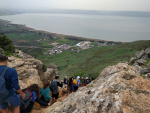
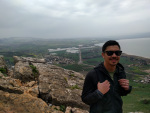
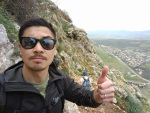

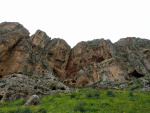

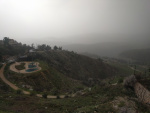





Finally, we spent the last few days of our trip in Tel Aviv. There, we shopped at the Carmel Market, biked along the coast, explored Old Jaffa, enjoyed our second Shabbat of the trip, heard from a LGBTQ activist, relaxed on the beach, hung out with kids at a home for Save a Child’s Heart, experienced Dialogue in the Dark, and went to Independence Hall.


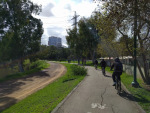




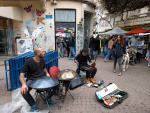
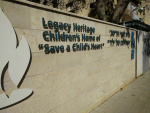
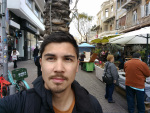

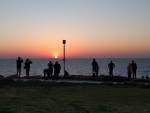
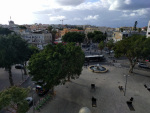
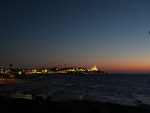

Besides all of that, we had amazing guides through an organization called Keshet. We ate a lot of shawarma, falafel, and kababs. We saw many, many stray cats. Overall, this was an amazing trip for me. I had never been to Israel before, and I didn’t think I’d ever end up visiting. (Of course, it was extremely exhausting to wear my teacher-hat for seventeen straight days.)
I’m still processing a lot of what I learned and experienced, but below are some of my take-aways as of right now. Not all are incredibly insightful or deep, but sometimes it’s helpful to re-realize things.
This shit is complex. By “this” I mean pretty much the whole geopolitical situation in that region. Going into the trip, I knew next to nothing about any of it. I knew Israel was a country. I knew Palestine was something. I knew there were problems between those two entities. After learning some of the history and talking to some of the people, I now understand a bit more of the details, but mostly I’m walking away with an appreciation of how little I know about the situation. It’s complex, and I’m not sure there’s any comparable situation in the world. This made me think about how often I feel the need to form an opinion on topics about which I know next to nothing.
Conversation is powerful. One of the things I really appreciated about Keshet’s tour is that they made an effort to expose our students to the diversity of Israel, setting up programs with speakers representing several minority groups in the country (most of which I mentioned in my recap above). It was powerful to hear their perspectives and to have the chance to ask questions. While it’s certainly not going to resolve all the problems in the world, it’s a first step toward breaking down some of the barriers that perpetuate misunderstanding, fear, and conflict.
We need to learn other languages. In order for the kind of conversations I mentioned above to occur and to be more than just one-way, short-lived spectacles, we (Americans, mostly) can’t just rely on others to know English. Language is important. We must learn other languages and have the ability to have these conversations not just in English if we truly hope for transformation.
Maybe mandatory service is a good idea. One of the things that I kept thinking about while on this trip was Israel’s requirement that all Jewish and Druze citizens are required to serve in the military (2 years for women, 3 years for men), with some exceptions. As a pacifist (in theory), this rubbed me the wrong way. But the more I learned about it and thought about it, the more I saw the potential benefits of such a requirement. First, students entering college are 21 or so instead of 18 and bring “real life” experience. They might have more maturity and a better sense of what they want to study than students who are just pushed straight into college after high school because it’s what they’re supposed to do. Second, politicians (and citizens, in general) who have served in the military themselves might consider more carefully the costs of entering war–especially if they have children who might lose their lives as a result. Finally, for some segments of the population, there’s the ability to serve in another capacity such as working in a community service capacity instead of combat, which can affect people in many positive ways. Of course, there are many negatives I can think of as well, so I’m still thinking on this one.
Getting to know students outside of the classroom is good for a teacher’s soul. I was in a unique position going into this trip–I knew only a handful of the students, who were all juniors. I just started teaching at the school, and I have sophomore and senior classes. This initially struck me as a negative, but it was actually refreshing to get to know students outside of the context of the classroom. I could just have conversations with them about their lives, Star Wars, their reactions to different parts of the trip, etc. I didn’t have preconceived notions of who they were based on how well they could write essays or how often they completed homework, and I knew I didn’t have to grade them on anything when we returned.
I need Shabbat. I know Judaism is not the only religion that commands followers to take a Sabbath once a week, but one of the most amazing things about this trip was seeing the Jewish quarter of Jerusalem completely shut down from sunset on Friday until sunset on Saturday. Stores closed. The roads were filled with people instead of cars. People powered down cell phones and electronics. In such a hyper-connected world, it was almost magical to see this happen and to conceptualize the fact that it happens weekly. You don’t even need to be religious to see and sense the value in carving out and protecting a time to rest and be present with one another.

February 19, 2017
WHERE’S RANDY?
[image error]
Greetings, friends. I know I haven’t been blogging much lately, so I wanted to give you a quick update on what I’ve been up to in order to reassure you I haven’t fallen off the face of the earth…
I finished revisions and edits on After the Shot Drops ! This took a couple rounds and a few months, but (hopefully) the book is much better now. From here, I’ll need to do copy edits (proofreading the actual pages, basically), then I should see a draft of the cover. In a couple months, the ARCs (advance review copies) should start going out to reviewers, and then it will hit shelves in spring 2018!
I felt like writing something new, so I put The Goblin & The Whale on the back burner (it needs some heavy revisions before it’s ready to start shopping to publishers). I’ve written about 6,000 words this new secret project, and it’s much more personal than my other books. My goal is to finish the first draft by summer.
I’ve picked up the habit of reading a bit of poetry every night. With my own writing, I started with poetry, but then I kind of stopped reading it/writing it as I began to write fiction. However, there’s a power in imagery and musicality of language that I feel like my writing’s been lacking, so I’m hoping dipping back into poetry can revive those skills. I’ve since read Patrick Rosal’s Brooklyn Antediluvian and Claudia Rankine’s Citizen, and now I’m making my way through Sarah Kay’s No Matter the Wreckage and Jason Bayani’s Amulet.
I’ve consumed a ridiculous number of articles about the state of our country. I’ve attended protests and readings, I’ve had countless conversations with people about what’s going on. I’ve been thinking a lot about what I can do beyond writing fiction and teaching in a way that fosters empathy. No answers, yet.
For some self-care, I’ve been playing video games (Uncharted 4, The Last of Us, and FFXV), reading comics (Jonesy,Black Panther, The Arrival, Through the Woods, Love is Love), watching TV (Blackish, Modern Family, Fresh Off the Boat, This is Us, Steven Universe, Over the Garden Wall), and hiking (we went to Yosemite for the first time a couple of weeks ago!).
I’m still teaching high school English full time, and I’ve been prepping for a 17-day trip to Israel that leaves today. I’m going as a chaperone for our school’s junior class trip.
See–I have been doing stuff!*
*I’m speaking more to myself here than to any of you.

December 26, 2016
MY FAV READS OF 2016
[image error]
Happy holidays, friends! According to Goodreads, I read 77 books this year. Of those, I tweeted a thread of my favorite 16 starting here. Retweet this tweet by the end of 2016 (Pacific Time) for a chance to win your choice from my favs. (Sorry, US only!)

December 3, 2016
Why did I like this so much?: MOONLIGHT
This is part of a (planned) new series of posts called Why did I like this so much? in which I try to analyze my enjoyment with an eye toward learning from great artists to inform my own work.
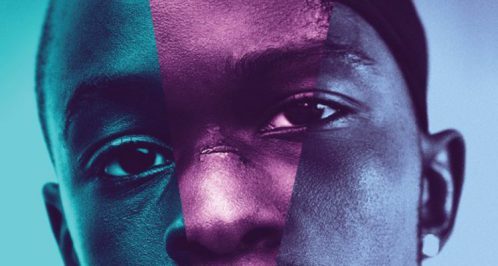
Last night I saw MOONLIGHT, directed by Barry Jenkins, and it was beautiful in a devastating yet hopeful kind of way. If you haven’t seen it yet, it’s the story of Chiron, a boy from a Miami housing project, told in three stages of his life: childhood, adolescence, and adulthood. After continuing to think about it since then, here are the reasons why I think I liked it so much, sans specific spoilers:
1. Effective minimalism.
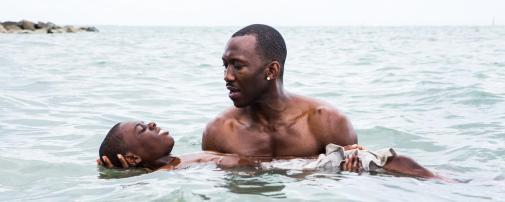
There’s so little dialogue in this film that I kept imagining the script as only twenty or thirty pages long. Yet, there’s an incredible amount of emotional depth to it–far more than a vast majority of movies. Like the image for the film I often saw used in PR materials (above), the story is carried by what’s simmering underneath, what’s unspoken. And what, exactly, is underneath? History (societal, familial, personal) and emotion (resentment, hatred, love, hope). Instead of being revealed through dialogue, this history and emotion is conveyed in small ways: body language, everyday actions, small but meaningful decisions. Then, when something is finally voiced, it feels that much more powerful because we fully understand and appreciate the history and emotion that led to it.
2. Simple goal, hard-fought for.
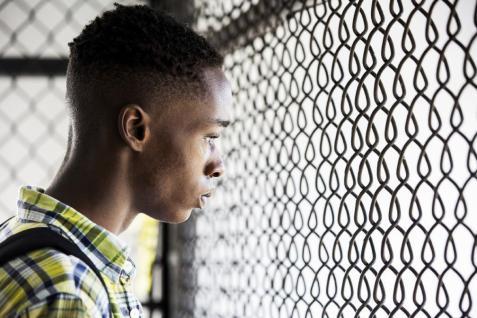
At the core of the film is a simple, universal desire: Chiron’s search for love and acceptance. Arguably, I’d say this is the core of most of our individual stories, but Chiron’s search is much more difficult than it is for many. Because of this, we want him to find that love and acceptance so badly. Jenkins, however, wrenches our hearts by not making it easy. The film–at so many times painful to watch–tests the resiliency of our own hope in a way that seems rough to us but incomparable to Chiron’s own experience.
3. #OwnVoices perspective.
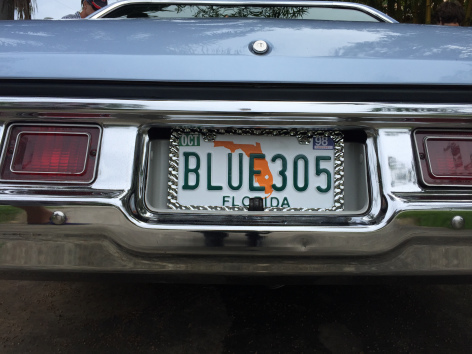
Throughout the entire film I kept thinking about the authenticity of the setting and dialogue. The film is bathed in details that were unfamiliar to me yet felt familiar because of the care in which they were constructed. Jenkins own childhood mirrors Chiron’s to an extent, which he has openly discussed. In an outsider’s hands, though, this same premise would have likely become something steeped in sympathy and negative portrayals of poverty, which likely would have felt offensive. Jenkins, however, understands–and is therefore able to convey–that alongside the ugliness coexist value, beauty, and love.
There you have it: why I liked MOONLIGHT so much, from a writer’s perspective. If you’ve seen it and would like to add some of your own reasons, please feel free to do so in the comments below.

October 5, 2016
FIL-AM HISTORY MONTH
In case you didn’t know, October is officially Filipino American History Month! As a Filipino American, I’m usually like, “Woo!” and that’s about it. This year, I decided to tweet a mini-story a day on topics related to the Fil-Am history. I’m not doing this as an expert, but rather as a way to force myself to learn more about my heritage. As the month progresses, I’ll be collecting the starting points for each daily thread right here. So if you’re interested, check it out, and keep coming back if you happen to miss any of the days on Twitter.
OCT 1: The first recorded Filipinos in North America
10/18/1587: 1st recorded Filipinos in N. America arrive in Morro Bay, CA aboard a Spanish Galleon. #FilipinoAmericanHistoryMonth
— Randy Ribay, Sir (@randyribay) October 1, 2016
OCT 2: The shipwreck of the San Agustin
Gather round, children, it's day 2 of #FilipinoAmericanHistoryMonth. Today's story: the shipwreck of the San Agustin!
— Randy Ribay, Sir (@randyribay) October 2, 2016
OCT 3: St. Malo, the first recorded permanent Filipino settlement in the US
It's day 3 of #FilipinoAmericanHistoryMonth. Today's topic: St. Malo, the first permanent Filipino settlement in N. America!
— Randy Ribay, Sir (@randyribay) October 3, 2016
OCT 4: The Filipino who helped settled Los Angeles
Ahoy, Twitter, I'm back for day 4 of #FilipinoAmericanHistoryMonth. Today's topic: Antonio Miranda Rodriguez, one of LA's first settlers.
— Randy Ribay, Sir (@randyribay) October 4, 2016
OCT 5: How the Philippines became part of the US
It's time for your daily dose of #FilipinoAmericanHistoryMonth! Today we're talking about how the Philippines became part of the US.
— Randy Ribay, Sir (@randyribay) October 6, 2016

October 3, 2016
MY FIRST TIME
In effort to encourage voter registration, a few YA authors started a campaign in which they made brief videos about their first time voting. I was tagged by Ami Allen-Vath to do the same, and now I tag Kelly Loy Gilbert and Paul Krueger. Check out my story below and visit RockTheVote.com for more info about registering to vote!
 [image error]
[image error]
July 19, 2016
AFTER THE SHOT DROPS
As a debut novelist, I lived with the constant fear that my first book would be so horrible or sell so poorly that I’d never publish anything ever again. Well, in your face, crippling self-doubt! I’ve sold my next YA novel to Houghton Mifflin Harcourt! Here’s the announcement from Publisher’s Weekly:

And you can add it to your TBR shelf on Goodreads here!
I’m really excited to be working with editor Margaret Raymo (who works with such powerhouses as Lois Lowry, Kwame Alexander, and Barry Lyga) and with HMH (whose list includes such greats at The Giver, The Crossover, Curious George, The Little Prince, and many more).
I love the characters in story so much, and I can’t wait for everyone to meet them. (Sorry that it will take a couple of years. That’s just how publishing works.)
In the mean time, here are some GIFs to properly convey my emotions.





(Stay tuned for a post about the return of self-doubt.)

June 16, 2016
ON EMPATHY, PART I
“Closing your eyes isn’t going to change anything. Nothing’s going to disappear just because you can’t see what’s going on. In fact, things will even be worse the next time you open your eyes. That’s the kind of world we live in. Keep your eyes wide open. Only a coward closes his eyes. Closing your eyes and plugging up your ears won’t make time stand still.” -from Kafka on the Shore by Haruki Murakami
I did not personally know anyone who was killed or injured in Orlando last weekend. Yet, I am grieving. I am angry and frustrated. I despair. I feel the urge to do something, to say something, to love in such a way that will tip the scales in the other direction. As such, I want to talk about empathy, one of the most valuable and holy things in the world. *
For most of us, our introduction to empathy probably came in the form of learning the Golden Rule as a child: treat others as you wish to be treated. You were being asked to imagine yourself as another person, to feel as they might be feeling in a given moment so as to consider how your actions might affect that them.
Empathy is emotional flexibility. The more similar someone is to you, the less flexibility it requires to empathize with them. The more different or unfamiliar, the more flexibility it requires. If we are to live in a better world, we must strive to increase our flexibility.
LEVELS OF EMPATHY
Level 1: Empathizing with the similar
If you are a Black male teenager, it is not difficult to identify with Trayvon Martin. If you are a parent with a school-aged child, it is not difficult to mourn for the children of Columbine or Sandy Hook. If you are a female who has been sexually abused, the Stanford woman’s words probably resonated in your soul. If you are of Syrian descent, then the hundreds of thousands of Syrians who have died in civil war or while trying to cross the Mediterranean Sea are probably never far from your thoughts. If you are a veteran of war who has contemplated suicide, then every article about the high rate of suicide among veterans is probably another stab in your heart. If you are part of the LGBTQIA+ community, then you probably imagined yourself in the Pulse night club in Orlando last weekend.
That could have been me, you think. And it is easy to see yourself in that person because you share some vital piece of identity with them.
This is important. This is holy. You have stepped outside of yourself.
Some people might say this is not selflessness but selfishness. That the concern you feel for the victims in such an instance is really just the self-preservation instinct kicking in. I do not think they are wrong—but only if you stop there. But in my opinion, we are given the ability to feel deeply for those who are similar to us but who are not us as a starting point. It is the first lesson of the first unit of the introductory course on Empathy. If we are to live in a better world, we must take the rest of the course.
Level 2: Empathizing with the familiar
I think the next step in increasing our ability to empathize is through the love we feel for those who are close to us. Because we care about that person, we care about what happens to them even if they are different from us in some aspect we perceive as important.
This is the parent who sheds their transphobia after their child tells them they want to transition, the friend who feels outrage when people misconstrue Islam because her best friend is Muslim, the advocate who fights for the rights of the differently abled because their brother is blind. This is the teacher who will not allow “gay” to be used as an insult in his classroom because he has seen language damage students before, the man that refuses to laugh at his friend’s joke about domestic violence because he saw his mother abused by his father.
We know these people. They are not us, but they matter to us, so we are able to imagine how they feel because we know their stories. They have shared them with us, or we have been alongside them as those stories unfolded. We are sometimes even able to extend that concern to those we do not know but who are similar to the ones we love. We do not want any of them to experience discrimination, exclusion, or harm. We acknowledge their humanity. So we alter our own behaviors to ensure that we do not contribute to their suffering, and we might advocate for other people or entire systems to likewise alter their actions.
Level 3: Empathizing with the unfamiliar
The next level of empathy asks us to empathize with those with whom we believe are completely unfamiliar. They do not seem similar to us or anyone we know. I believe there is a wide gap between the previous level of empathy and this one. I think most people never make it here because it requires a great amount of emotional flexibility.
If you are neither of Greek descent nor close to anyone who is, then the country’s economic crisis is a difficult thing to comprehend. If you are neither intersex nor know close to anyone who is, then you probably do not even know what “intersex” even means. If have neither been poor nor close to anyone who is, then you are probably baffled as to how people remain poor. If we do not know anyone who has died as a result of an inaccurate drone strike, then we have trouble imagining that anyone who didn’t deserve to has been killed as result of this method.
Empathizing with those who we deem completely unfamiliar is like imagining what it would be like to step onto Mars. Yes, we know it’s there. We’ve seen the pictures, and we’ve seen some movies with really great special effects. But it is so far removed from anything we have personally experienced that our attempts to imagine it are vague and fuzzy.
Yet, I think we must try. Our world is more connected than ever thanks to technology, so it has become much more difficult to uphold the delusion that those who are unfamiliar to us do not exist and are not just as human as we are. The information is there, the voices are telling their stories. But we have to choose to open our eyes, to uncover our ears, to unstop our hearts.
Level 4: Empathizing with those who harm
In my opinion, this is the most difficult level. It is by far the level that requires greatest emotional flexibility not because the person is so unfamiliar, but because we simply do not want to. It is uncomfortable, it is painful, it is shameful. Perhaps the perpetrator is too familiar to us, and we do not want to acknowledge that we share so much with someone who could do something so terrible. Perhaps we are so close to the victims that to identify with the one who harmed them feels like a betrayal. Whatever the reason may be, we are encouraged to despise those who commit crimes. It feels safe. If feels right.
As Lin Manuel Miranda once said in an interview when asked about his favorite fictional villain, “I don’t believe in villains.” If we are to insist on the humanity of everyone, then we cannot deny the humanity of anyone. We cannot simply write off thieves, rampant racists, murders, and rapists as deranged individuals.
Instead, I think—when the pain is not so fresh—we need to step back and try to empathize with that person. Why did he do it? Where did his hatred, anger, or rage come from? Why was that person so unable to empathize with those they harmed? How has society played a role in creating this person? How has biology? What could we have done to prevent this person from feeling like this was his only option? What can we could we do to prevent others from feeling similarly?
That is not to say empathy means we should not seek justice. But I think empathizing at this level is unimaginably valuable. It asks us to exchange the instant gratification revenge might provide for the long-term benefits of wisdom. Revenge seeks to ensure that the particular individual will never commit that crime again, while wisdom seeks to figure out how to ensure that nobody will ever commit that crime again.
There is certainly much more to say on the subject of empathy, but I think this is a good stopping place. Later this week, I will post Part II, which will discuss how I think we can expand our capacity for empathy as well as the importance of understanding its limitations.
*I am a teacher and an author, not a psychologist or sociologist. I wrote this post simply to say what I feel compelled to say about empathy. I do not presume to be an expert.
**A note on the use of pronouns: I’m eternally bothered by the fact that English does not have a non-gendered singular pronoun. When I write, I switch between, he, she, and they/them. In most cases I am referring to a hypothetical non-gendered person.

June 11, 2016
Randy Ribay's Blog
- Randy Ribay's profile
- 1032 followers




